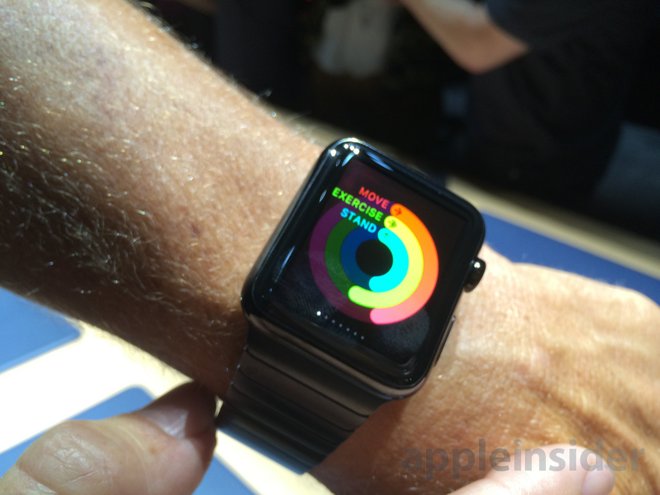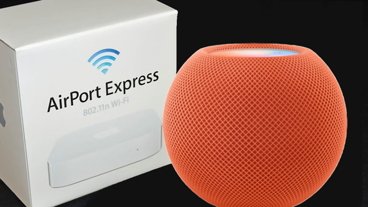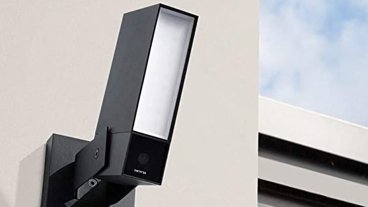Apple will offer a low power mode on Apple Watch to help boost it through longer days, according to a new report that also takes a stab at dispelling rumors that the company may have elected to all some long-rumored sensors last minute.
With the exception of Pebble products, most current and upcoming smartwatches - including the Apple Watch - will last no more than a day on a single charge. To help mitigate this issue, Apple has reportedly developed a still unannounced software feature of the Apple Watch called Power Reserve, according to the New York Times. It's said to cut power to all non-essential functions and display only the time, helping to extend the watch's life in cases where a recharge may not be possible. The function is similar in concept to the Battery Saver mode in Android 5.0, which can push smartphone battery life from minutes to hours by reducing processor use.
Apple previously stated that the Watch's battery should last only a normal day, requiring a fresh charge at night. Although standard among smartwatches, the issue has created controversy, since many had been hoping Apple would solve the smartwatch industry's battery woes with its inaugural effort.
The report also notes that despite some recent claims to the contrary, Apple's decision to abandon some advanced health tracking features came over 18 months ago, rather than at the last minute. Early experiments in tracking factors like blood pressure and stress are said to have been ditched after the sensors proved unreliable and otherwise unworkable. Instead, the first-generation device only features motion and heart-rate sensors, once again mirroring some competing smartwatches.
The Times also highlights some of the challenges that faced the Apple Watch's development cycle, noting that Apple not only encountered technical difficulties in achieving its ideal design but was also forced to battle the loss of key engineers, some of whom were poached by Google-owned home automation outfit Nest Labs. Among them was Bryan James, who became an Engineering vice president at Nest early last year.
Chief among some of the later challenges was keeping a tight lid on secrecy surrounding the product while simultaneously deploying evaluation units into the real world, for which Apple engineers created dummy casing, including some resembling Samsung smartwatches.
Apple is due to reveal more details about the Watch at a San Francisco press event on March 9th. AppleInsider will be offering live coverage of the event as it progresses.
 Roger Fingas
Roger Fingas







-m.jpg)






 Charles Martin
Charles Martin

 Malcolm Owen
Malcolm Owen
 William Gallagher
William Gallagher

 Christine McKee
Christine McKee
 Wesley Hilliard
Wesley Hilliard









27 Comments
A commentator on The Verge noted that Tim Cook typically gets up at 3:45am and goes to bed at 9:30pm. Let's hope Tim's comment about a day of use falls under the number of hours he awake and active. [quote name="AppleInsider" url="/t/184993/apple-watch-to-reportedly-offer-power-reserve-to-help-extend-battery-life#post_2683634"]With the exception of Pebble products, most current and upcoming smartwatches - including the Apple Watch - will last no more than a day on a single charge.[/quote] Cue people citing examples of glorified fitness trackers, analog watches with some fitness tracking capabilities, and vaporware to prove the author wrong.
I would think that Starbuck's and any sort airport vendors would make apple watch chargers available to patrons.
[quote name="DeWinter" url="/t/184993/apple-watch-to-reportedly-offer-power-reserve-to-help-extend-battery-life#post_2683653"]I would think that Starbuck's and any sort airport vendors would make apple watch chargers available to patrons.[/quote] I wouldn't. They don't offer any Lightning or micro-USB chargers so I wouldn't expect them to have any ?Watch chargers. Even if they did have smartphone and tablet chargers I still wouldn't expect them to offer ?Watch chargers because 1) you have to take your ?Watch off to charge, and 2) the ?Watch induction chargers are considerably more expensive than a Lightning or Micro-USB charging cable and generic power supply with a USB Type-A port. edit: Even if you're referring to an inductive charging table, I still don't see that being done because of ?Watch. [LIST][*] http://www.theverge.com/2015/3/1/8130119/ikea-wireless-power-consortium-qi-wireless-charging-furniture [/LIST]
This sounds like a desperate move akin to Samsung's power-saving mode, in which the phone goes black and white and functionality is rendered almost completely obsolete.
It also tells us that Apple haven't made some great breakthrough with battery life, so all those worrying about battery life will probably have to wait for the next model, if Apple are still making it by then, or abstain completely.
If the Apple Watch is this fragile as it stands, no wonder they didn't include GPS; that would have killed the battery like it’s going out of style.
The anticipation for the unicorn continues.
[quote name="Benjamin Frost" url="/t/184993/apple-watch-to-reportedly-offer-power-reserve-to-help-extend-battery-life#post_2683666"]This sounds like a desperate move akin to Samsung's power-saving mode, in which the phone goes black and white and functionality is rendered almost completely obsolete. It also tells us that Apple haven't made some great breakthrough with battery life, so all those worrying about battery life will probably have to wait for the next model, if Apple are still making it by then, or abstain completely. If the Apple Watch is this fragile as it stands, no wonder they didn't include GPS; that would have killed the battery like it’s going out of style. The anticipation for the unicorn continues. [/quote] Exactly right - "battery saving mode" is another name for "we have failed to achieve the desired breakthrough"; can't remotely imagine SJ settling with such a kludgy compromise. Still bulky, still fugly, still battery-weak and quickly obsolete, no matter how many Vogue covers they pay for. What about focusing on Macs again, Apple?